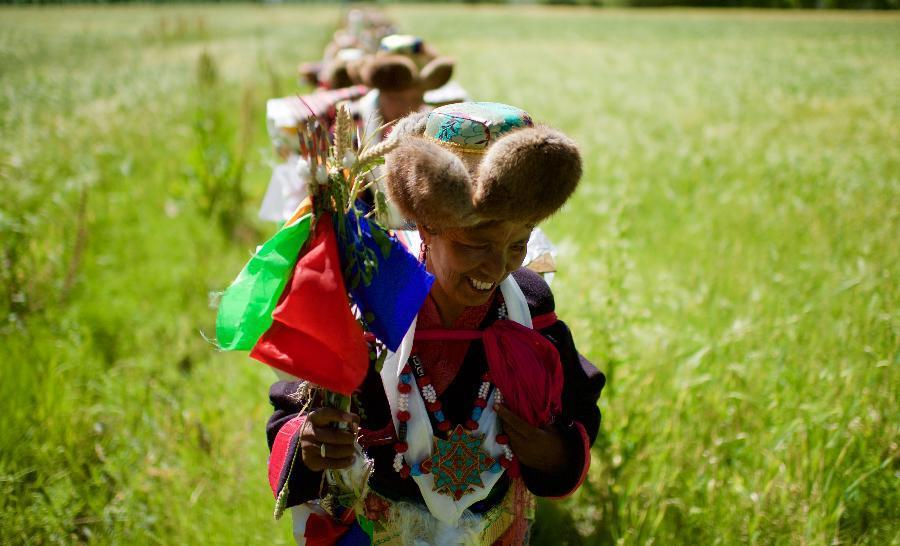Source:CNTV 2015-09-07
In rural China, the land is collectively owned. Each household is in charge of certain farmland and can pass it on to the next generation but can't sell or turn the land into other uses. That makes it difficult for farmers to earn any income except from their crops. China started nationwide land transfer trials in 2013 to clarify farmers' ownerships so that they could lease or mortgage their property.
Cultivated fields account for less than 1 percent of agricultural land in the Tibet Autonomous Region and ownership clarification has become a must-do. In the second episode of our special series "Eye On Tibet," our reporter Feng Xin visits one village and learns how land ownership is settled.

Photo shows that Tibetan farmers march around the first field land to pray for happiness in Lhoka Prefecture, Tibet Autonomous Region.
69-year-old Tenzin remembers that the last time his village ever designated land to each household was more than four decades ago.
Tenzin’s family was assigned a half hectare of land. That's slightly smaller than a football field. The family’s farmland has grown seven times larger over the years through swaps with other villagers. But not a square meter has ever been written down in black and white.
The Xigaze government chose Tenzin's village as a trial area for land ownership clarification last year and rumors soon spread throughout the village.
"Some people from other villages came to say the purpose of the trial was for the government to collect our land and give it to rich farmers. Some even came to our village to purchase our tools and machines, saying 'You won’t need them in the future anyway.' But since our villagers know the policy well, nobody believed the rumors," said Penpa Wangdue, the village chief of Neqiong village.
Wangdue says a transparent process was crucial to clearing up any misunderstandings. After an initial public hearing, the village invited state surveyors to measure and map each household’s farmland with satellite positioning technology. The surveyors then displayed the maps three times for possible public corrections. Now all that’s left to do is to issue a land ownership certificate to each family.
Farming only produces limited income these days, so leasing the land for other people to use while seeking jobs in cities or starting a business has become a common option for many rural residents.
Chemi has worked as a loan officer at the local Agricultural Bank for five years. He says obtaining a start-up loan was a huge and frequent headache for many farmers.
"Farmers now have more and more demand for loans, but it’s very difficult for them to find a guarantee company when applying for loans. Now as the land transfer policy comes out, every household will have its own land certificate. When farmers come to apply for mortgage loans, they will no longer need a guarantee company," Chemi said.
Land transfers here are only restricted to farmland. That means farmers can only rent out their land within the same village for farming purposes. But clarifying farmers’ land ownership is only the very first step. Challenges are ahead.
"Based on our current progress, I think after we issue the ownership certificates and people lease their land to some big production households, there might be problems with determining land prices or leasing prices," said Teng Bin, the Bazha township chief.
Teng Bin says that to meet the challenges, local officials need to do in-depth research to learn farmers' production costs and average land prices. No farmers will be forced to lease their land if they don’t want to.
As for Tenzin, he’s looking forward to receiving a land ownership certificate this December for the first time in his life. His family will farm by themselves.
Copyright © Xizang Daily & China Xizang News All rights reserved
Reproduction in whole or in part without permissions prohibited
Index Code: 藏 ICP 备 05000021 号
Producer: Xizang Daily International Communication Center